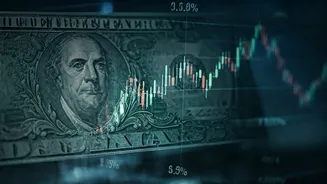Yields Remain Firm
Sonal Desai, the Executive Vice President and Chief Investment Officer at Franklin Templeton Fixed Income, shares her perspective on the US 10-year Treasury
yield. She anticipates that this yield will likely remain above 4%. Consequently, Desai suggests that the Federal Reserve might not feel compelled to implement further rate cuts. Her outlook hinges on the absence of exceptionally weak economic data. She observes that the Fed's current policy stance already leans towards being accommodative. Desai believes market fears of an economic slowdown are more driven by sentiment than grounded in hard data. Despite several rate cuts, bringing the policy rate down to 3.75%–4% from 5.50%, long-term yields have remained steady. Desai finds it curious that the 10-year yields haven’t fallen below 4% and are not at 4.50% or even higher. This persistent yield, according to her, can be attributed to fiscal challenges. These include potential legal issues surrounding US tariffs.
Fiscal Challenges & Tariffs
Desai suggests that factors such as fiscal challenges play a role in the consistent yields. These include concerns related to potential legal issues with US tariffs. She also argues that the Fed's existing policy already leans towards being looser than neutral. This would then reduce the need for more easing. Regarding the overall economy, Desai downplays the worries of tariff-related slowdowns. She states that tariffs in and of themselves never initiated an economic slowdown. Desai explains that consumption accounts for 70% of the US economy, with services forming the majority of that figure. This limits the direct impact of tariffs. Furthermore, Desai anticipates that fiscal expansion measures, such as tax rebates and investment incentives, will offer additional economic support, particularly early in 2026.
Dollar and Indian Bonds
Desai expects the dollar index to remain within a range-bound pattern. She characterizes its earlier depreciation as a correction from an unusually strong position. She adds that a court ruling against tariffs could potentially benefit the dollar. This would be by attracting capital inflows as yields adjust. Switching to India, Desai finds Indian bonds attractive due to the country's fiscal discipline, index inclusion, and strong economic fundamentals. She states that the weaker oil prices offset the rupee's export-related pressures. As for gold, Desai indicates that it has 'regained a significant position' and is unlikely to lose its strength soon. She attributes this to a global environment of higher inflation, rather than a loss of confidence in the dollar. Desai dismisses any talk of the dollar's decline as 'wildly overblown'. She adds that the dollar lacks a significant competitor in the currency world.
Yen and Further Insights
Sonal Desai also provided commentary on the Japanese yen. She described it as undervalued, while acknowledging that its appreciation may take time. Even though the Bank of Japan is expected to raise rates eventually, she doesn't foresee an immediate change. For those seeking a deeper understanding, the full interview provides comprehensive insights. Additionally, those interested in staying updated on market trends can find the latest updates.

















